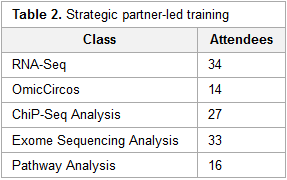Difference between revisions of "Template:Article of the week"
Shawndouglas (talk | contribs) (Updated article of the week text.) |
Shawndouglas (talk | contribs) (Updated article of the week text.) |
||
| Line 1: | Line 1: | ||
<div style="float: left; margin: 0.5em 0.9em 0.4em 0em;">[[File: | <div style="float: left; margin: 0.5em 0.9em 0.4em 0em;">[[File:Tab2 HosburghJofESciLib2018 7-2.png|240px]]</div> | ||
'''"[[Journal: | '''"[[Journal:Developing a bioinformatics program and supporting infrastructure in a biomedical library|Developing a bioinformatics program and supporting infrastructure in a biomedical library]]"''' | ||
Over the last couple decades, the field of [[bioinformatics]] has helped spur medical discoveries that offer a better understanding of the genetic basis of disease, which in turn improve public health and save lives. Concomitantly, support requirements for molecular biology researchers have grown in scope and complexity, incorporating specialized resources, technologies, and techniques. | |||
To address this specific need among [[National Institutes of Health]] (NIH) intramural researchers, the NIH Library hired an expert bioinformatics trainer and consultant with a PhD in biochemistry to implement a bioinformatics support program. This study traces the program from its inception in 2009 to its present form. Discussion involves the particular skills of program staff, development of content, collection of resources, associated technology, assessment, and the impact of the program on the NIH community. ('''[[Journal:Developing a bioinformatics program and supporting infrastructure in a biomedical library|Full article...]]''')<br /> | |||
<br /> | <br /> | ||
''Recently featured'': | ''Recently featured'': | ||
: ▪ [[Journal:Big data and public health systems: Issues and opportunities|Big data and public health systems: Issues and opportunities]] | |||
: ▪ [[Journal:Generating big data sets from knowledge-based decision support systems to pursue value-based healthcare|Generating big data sets from knowledge-based decision support systems to pursue value-based healthcare]] | : ▪ [[Journal:Generating big data sets from knowledge-based decision support systems to pursue value-based healthcare|Generating big data sets from knowledge-based decision support systems to pursue value-based healthcare]] | ||
: ▪ [[Journal:Characterizing and managing missing structured data in electronic health records: Data analysis|Characterizing and managing missing structured data in electronic health records: Data analysis]] | : ▪ [[Journal:Characterizing and managing missing structured data in electronic health records: Data analysis|Characterizing and managing missing structured data in electronic health records: Data analysis]] | ||
Revision as of 18:09, 14 May 2018
"Developing a bioinformatics program and supporting infrastructure in a biomedical library"
Over the last couple decades, the field of bioinformatics has helped spur medical discoveries that offer a better understanding of the genetic basis of disease, which in turn improve public health and save lives. Concomitantly, support requirements for molecular biology researchers have grown in scope and complexity, incorporating specialized resources, technologies, and techniques.
To address this specific need among National Institutes of Health (NIH) intramural researchers, the NIH Library hired an expert bioinformatics trainer and consultant with a PhD in biochemistry to implement a bioinformatics support program. This study traces the program from its inception in 2009 to its present form. Discussion involves the particular skills of program staff, development of content, collection of resources, associated technology, assessment, and the impact of the program on the NIH community. (Full article...)
Recently featured:










